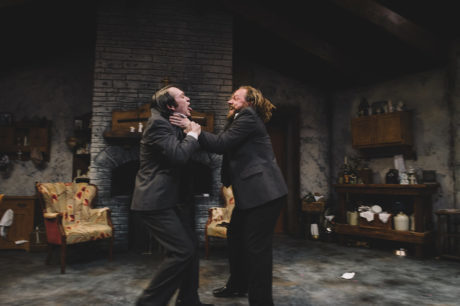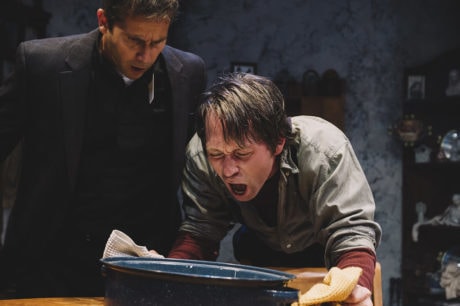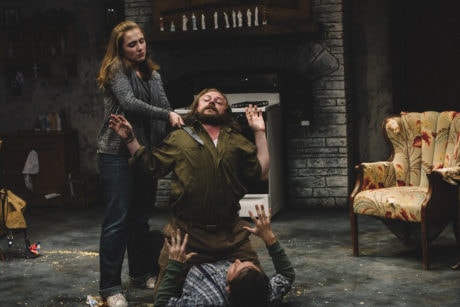In real life, when we are spectators to two grown men facing off in dead-serious combat—right in front of us; with words, fists, lethal weapons, whatnot; unmediated by movies and such—our natural response is fright, for fear that the fight will get out of hand and include us. The more the conflict turns violent, the more urgently we wish to steer clear of it. And whatever high-minded notion we might entertain to intervene and break the battle up, our impulse would be tempered by the not unreasonable foreknowledge that putting ourselves in harm’s way between two androgenized antagonists could, depending on the severity of their animus, get us killed.

I mention this everyday dude drama as context for considering what makes The Lonesome West—now playing in an outstanding production at Keegan Theater—such a comedic triumph. For this dark comedy by Martin McDonagh about two quarreling brothers literally allows us to triumph over our aforementioned ingrained fear.
My DCMetroTheaterArts colleague David Friscic, in his spot-on five-star review of this production, quotes the playwright dissuading the very sort of dissection of his work I’m doing now:
People should leave a theatre with the same feeling that you get at a really good rock concert. You don’t want to talk about it, you just let it buzz into you. I can’t stand people analyzing things. A play should be a thrill like a fantastic rollercoaster.
Of course McDonagh is correct in that. He’s also being a bit disingenuous. Because I believe he knows exactly what he’s up to in his dark comedies. Yes, The Lonesome West is a fantastic ride. But seeing how cunningly the rollercoaster is constructed can be its own kick too.
McDonagh’s comedy has fascinated me ever since the first play of his I saw. After Forum Theater opened its recent production of The Pillowman, I talked with its director, Yury Urnov. In an interview published as “The Cathartic Comedy of Martin McDonagh,” Urnov explained to me the way McDonagh uses humor to break through social walls of prohibition. Urnov also told me a story about how in a context of political repression, he observed the humor in The Pillowman disempower the fearsomeness of tyranny.

McDonagh’s comedy is laugh-out-loud funny, to be sure. But there’s always a method to it.
In The Lonesome West, McDonagh layers hilarity over a mano-a-mano feud that in real life and real time would induce stress not belly laughs. The Connor Brothers, Coleman (Matthew J. Keenan) and Valene (Bradley Foster Smith), may seem bumbling buffoons, but make no mistake: they are trigger-happy foes with enough fistfuls of resentment to shoot to kill.
McDonagh scripts their savage and macabre verbal sparring. Director Mark A. Rhea paces each round with knockout punch. Keenan and Smith play high-risk foils as if on a high-tension high wire. And Casey Kaleba tightly stages each fight with a startling mix of hostility and silliness.
The two other characters in The Lonesome West both have important functions in McDonagh’s cathartic comedic scheme. The local rector, Father Welsh (Chris Stezin), tries to play the intercessor, to referee the brothers and get them to just get along. Despite his earnest entreaties, he fails, which becomes a running joke. But part of what turns his vain attempts into comic relief is that he stands in for our high-minded impulse to intervene between two determined adversaries and—whew—he’s doesn’t get hurt.
The village moonshine runner Girleen (Sarah Chapin) plays another important role in how McDonagh’s combat-comedy plays out. As the sole female character in a drama that turns on animus between two male characters, Girleen has a structural function that is as profound for what it isn’t as for what it is. She isn’t the girl whom the guys bond over or against—a cliché resolution in both life and art that McDonagh here assiduously avoids. She is a woman of independent mind and means. And as McDonagh writes both brothers, they know well enough not to mess with her.

We naturally feel anxiety whenever we witness up close and personal two men really having at it, really having it in for each other. In McDonagh’s The Lonesome West that underlying anxiety serves to make the funny funnier. McDonagh’s funny, in turn, makes the anxiety dissipate, at least for the duration of the show. Ergo, the buzz.
Don’t miss it. Go feel it. And remember to forget everything you’ve just read.
Running Time: Two hours and 30-minutes, with a 15-minute intermission.
The Lonesome West plays through August 27, 2016 at The Keegan Theatre -1742 Church Street, in Washington, DC. For tickets, call the box office at (202) 265-3767, or purchase them online.
LINKS:
‘The Lonesome West’ at The Keegan Theatre reviewed by David Friscic.
Spine: ‘The Lonesome West’ and Other Motherless Places at Keegan Theatre by Robert Michael Oliver.
Magic Time! ‘The Lonesome West’ at The Keegan Theatre by John Stoltenberg.




